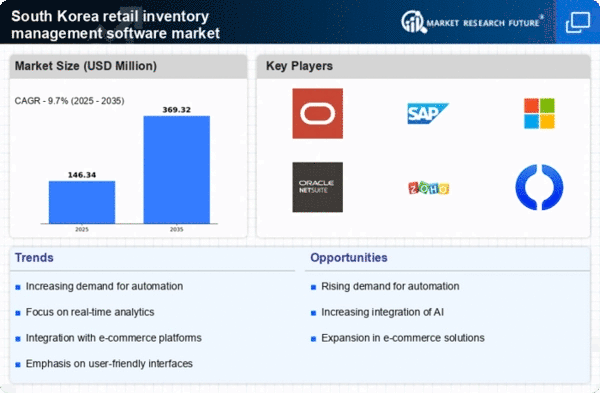Rising E-commerce Demand
The retail inventory-management-software market is experiencing a notable surge due to the increasing demand for e-commerce solutions in South Korea. As online shopping continues to gain traction, retailers are compelled to adopt sophisticated inventory management systems to streamline operations. In 2025, e-commerce sales in South Korea are projected to reach approximately $100 billion, indicating a robust growth trajectory. This shift necessitates the integration of advanced software that can efficiently manage stock levels, track shipments, and optimize supply chains. Consequently, the retail inventory-management-software market is expected to expand as businesses seek to enhance their operational efficiency and customer satisfaction in a competitive online landscape.
Consumer Demand for Personalization
The retail inventory-management-software market is influenced by the growing consumer demand for personalized shopping experiences. As customers increasingly expect tailored offerings, retailers must manage their inventory more effectively to meet these expectations. In South Korea, studies indicate that 70% of consumers prefer personalized services, prompting retailers to adopt inventory management solutions that enable them to analyze customer preferences and adjust stock accordingly. This trend is likely to drive the demand for advanced inventory management software that supports personalization efforts, thereby contributing to the growth of the retail inventory-management-software market.
Regulatory Compliance and Standards
The retail inventory-management-software market is also shaped by the need for compliance with various regulatory standards in South Korea. Retailers are increasingly required to adhere to strict regulations regarding inventory tracking, reporting, and data security. This compliance necessity drives the demand for sophisticated inventory management solutions that can ensure adherence to these regulations. In 2025, it is anticipated that compliance-related software features will become a critical component of inventory management systems, influencing purchasing decisions. Thus, the retail inventory-management-software market is projected to grow as businesses prioritize compliance and risk management.
Technological Advancements in Software
The retail inventory-management-software market is significantly influenced by rapid technological advancements. Innovations such as cloud computing, machine learning, and mobile applications are transforming how retailers manage their inventory. In South Korea, the adoption of cloud-based solutions is expected to grow by 30% in the next few years, allowing businesses to access real-time data and analytics from anywhere. This flexibility enhances decision-making processes and improves overall efficiency. As retailers increasingly recognize the benefits of these technologies, the demand for sophisticated inventory management software is likely to rise, driving growth in the retail inventory-management-software market.
Increased Focus on Supply Chain Efficiency
The retail inventory-management-software market is being propelled by an increased focus on supply chain efficiency among retailers in South Korea. Businesses are recognizing the importance of optimizing their supply chains to reduce costs and improve service levels. In 2025, it is estimated that companies investing in supply chain optimization will see a 15% reduction in operational costs. This trend is prompting retailers to seek advanced inventory management solutions that provide better visibility and control over their stock. As a result, the retail inventory-management-software market is likely to benefit from this heightened emphasis on supply chain efficiency.
















